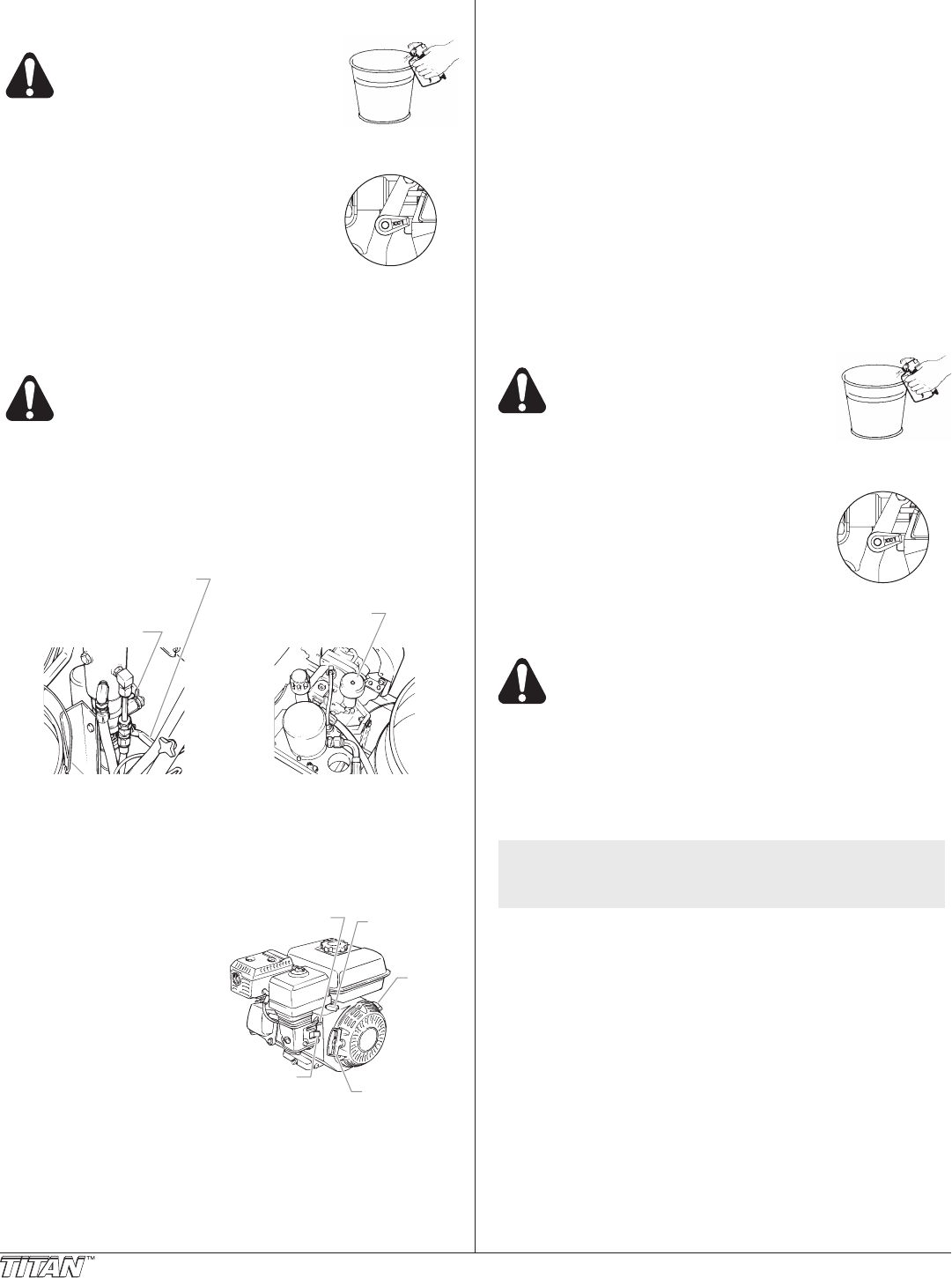
8 © Titan Tool Inc. All rights reserved.
13. Unlock the gun by turning the gun trigger lock to the
unlocked position.
Ground the gun by holding it
against the edge of the metal
container while flushing. Failure to
do so may lead to a static electric
discharge, which may cause a fire.
14. Trigger the gun into the metal waste container until the old
solvent is gone and fresh solvent is coming out of the gun.
Trigger locked
(gun will not spray)
15. Lock the gun by turning the gun trigger
lock to the locked position.
16. Set down the gun and increase the
pressure by turning the pressure
control knob slowly clockwise.
17. Check the entire system for leaks. If
leaks occur, follow the “Pressure Relief
Procedure” in this manual before
tightening any ttings or hoses.
18. Follow the “Pressure Relief Procedure” in this manual
before changing from solvent to paint.
Be sure to follow the pressure relief procedure
when shutting down the sprayer for any purpose,
including servicing or adjusting any part of the
spray system, changing or cleaning spray tips, or
preparing for cleanup.
Painting
1. Place the siphon hose into a container of paint.
2. Place the bleed hose into a metal waste container.
3. Set the pressure to minimum by turning the pressure
control knob fully counterclockwise.
Bleed Valve
Hydraulic Shut-off
Valve (in closed
position)
Pressure
Control Knob
4. Open the hydraulic shut-off valve located on the hydraulic
pressure hose. The handle should be in line with the
hose.
5. Open the bleed valve by rotating the bleed valve handle
fully counterclockwise.
6. Start the engine or turn on the electric motor.
a. To start the gas engine,
Fuel Valve
Lever
Choke Lever
Engine
Switch
Throttle
Lever
Starter Rope
• move the fuel valve
lever to the open
position,
• move the throttle lever
to its middle point,
• move the choke lever
to the closed position
for a cold engine or to
the open position for
a warm engine,
• turn the engine switch
to the ON position,
and
• pull the starter rope briskly until the engine starts.
b. To start the electric motor, move the ON/OFF switch to
the ON position.
7. Turn the pressure control knob clockwise approximately
1/3 of the way down to increase pressure until the sprayer
cycles evenly and paint ows freely from the bleed hose.
8. Turn off the sprayer.
a. To turn off the gas engine,
• set the pressure to minimum by turning the pressure
control knob fully counterclockwise,
• move the throttle lever to the slow position, and
• turn the engine switch to the OFF position.
b. To turn off the electric motor,
• set the pressure to minimum by turning the pressure
control knob fully counterclockwise,
• move the ON/OFF switch to the OFF position.
9. Remove the bleed hose from the waste container and
place it into the container of paint.
10. Close the bleed valve by rotating the bleed valve handle
fully clockwise.
11. Start the engine or turn on the electric motor.
12. Turn the pressure control knob clockwise approximately
1/3 of the way down to increase pressure.
13. Unlock the gun by turning the gun trigger lock to the
unlocked position.
Ground the gun by holding it
against the edge of the metal
container while flushing. Failure to
do so may lead to a static electric
discharge, which may cause a fire.
14. Trigger the gun into the metal waste container until all air
and solvent is ushed from the spray hose and paint is
owing freely. from the gun.
Trigger locked
(gun will not spray)
15. Lock the gun by turning the gun trigger
lock to the locked position.
16. Turn off the sprayer.
17. Attach tip guard and tip to the gun
as instructed by the tip guard or tip
manuals.
POSSIBLE INJECTION HAZARD. Do not spray
without the tip guard in place. Never trigger the
gun unless the tip is in either the spray or the
unclog position. Always engage the gun trigger
lock before removing, replacing or cleaning tip.
18. Start the engine or turn on the electric motor.
19. Increase the pressure by turning the pressure control knob
slowly clockwise and test the spray pattern on a piece
of cardboard. Adjust the pressure control knob until the
spray from the gun is completely atomized.
NOTE: Turning the pressure up higher then needed to
atomize the paint will cause premature tip wear
and additional overspray.
